- Home
- A P Bateman
The Five Page 3
The Five Read online
Page 3
“That’s just because the bloody yanks like their military crap. They go out with an AR-15 with all sorts of shit stuck to it on Picatinny rails – laser sights, torches, night-vision. Hell, a twelve-gauge strapped underneath. In other countries, real hunters would head out with a bolt action .308. End of story,” he paused, shaking his head. “I don’t know what this guy is doing, but there is no way in hell he made a seven hundred metre shot on a springbok with a .22 based bullet. No matter what the back-charge was.”
“I saw it ‘bro.”
“And I said, bullshit!” He swerved as a warthog shot out from the bushes and ran across the track. The truck threw up a cloud of dust, drifted a little and then got back on line. He did not lift the throttle, and nor did he brake. “Where is he now?”
“Peter’s Ridge,” he paused. “And I’m telling you - I saw it. Seven hundred metres at least and the guy was standing.”
The older man nodded. “Okay, ‘bro. Let’s go and look at this six thousand metre genie… see what other tricks come out of the bottle.”
The drive was a little over forty minutes away. It was deep in the South African bush, in the Gauteng province. Close enough to the city and airport, the townships for labour and help when needed, but just an hour’s drive and the bush enveloped you, surrounded you with the big five game animals. These were the animals initially chosen by western settlers and adventurers as the most dangerous to hunt. Lion, leopard, rhinoceros (both black and white species), elephant and Cape buffalo. Nowadays, tourists’ sightseeing lists differed from the original big five, with people wanting to see giraffes, zebras and gazelles as well. But hunters were old school. Hunters wanted to kill the animals they had read about as a child, or had seen in movies. They wanted the big five. Hemingway’s Africa. And with enough money, they could tick an animal off their list and take a photo of their slaughtered quarry, with their rifle over their shoulder and chest inflated.
The poverty in the surrounding villages meant a government permit for the killing of a small number of elephants had been granted, but only if the beast was in poor health or harmful to the rest of the herd, and only if the carcass was butchered and distributed among the people soon enough. The ivory had to be destroyed, but there was always a little to get past the paperwork and this was easily traded with the Chinese, who were all over Africa these days.
Minerals and precious metals, oil, fossil fuels and contracts to build roads as well as supplying inexpensive cars to drive on them. China owned Africa now. But unlike the British Empire, China hadn’t needed to fire a single shot, nor wave a flag. They had bought off officials, haemorrhaged money into building roads to connect their investments and bought up the mineral rights in return for providing gainful employment for the locals. Their investment across the continent spanned many countries, but only those with something to exploit.
The two men had driven past the last of the villages. There was now no habitation for the next two hundred miles. It was here that the company brought people in to hunt the big five. There were many other animals to be hunted, but these were the most prized kills. The five that were worth the effort and the reward.
Romo Badenhorst and his younger brother Vigus ran the company. They employed several white South African rangers, a British chef and up to thirty local blacks who helped keep their business one of the best hunting experiences on the entire continent. From housekeeping and gardening to property maintenance and driving. Even cleaning the swimming pool and patrolling to keep animals out of the grounds of the lodge while the wealthy hunters sipped iced beer and told stories and tall-tales around the fire-pit, while Michelin rosette worthy food was prepared for them inside.
The culling of elephants was a sound business model, and the gifting of the meat to the locals meant that many hundreds of people on the poverty line ate well throughout the year with communal freezers and biltong – the spiced South African dried meat - making the meat available to all. There was much to be gained from this practice, not least the local’s objection to poachers and the illegal ivory trade. They gained food from the legal hunts, some gained employment, but every one of the locals gained something. Poaching threatened all of this. The Badenhorst brothers sailed close to the wind though, several sets of tusks escaped the dying pits or the fire piles and went missing each year, netting them over three hundred thousand US dollars, which they banked off-shore. It was their retirement fund, and although fifteen years separated the two brothers, they aimed to have just over three million dollars each when they retired. Their ranch-style house, complete with swimming pool and grounds, and even an airstrip, was an easy sell, and they posted company profits of around one and a half million rand a year, or just over one hundred thousand US dollars after hefty director’s salaries and dividends. Enough to pay taxes and have a healthy income, but much was put back into weapons and ammunition, vehicles and equipment. These were then sold for cash in the next tax year and not put back into the business. The practice had started when finances had been tight after their father’s death, and had now escalated to the point where a thorough tax audit would land them more jail time than Nelson Mandela. Hence the out. The off-shore accounts were steadily building not only with their blood ivory, but from the sales of rifles, ammunition and used vehicles. Some to hunters and other businesses, and some to warlords in provinces and countries further north. Romo Badenhorst always joked that any potential tax inspector might well wander off into the bush and get to meet a lion closer than recommended, if or when the time came for an audit.
When people cross the lines of both legality and morality, the slope is both steep and slippery. It rarely levels out. Hence men like the hunter they were going to find. People who wanted to use a more testing rifle calibre. For years, the .375 magnum rifle cartridge was the legal minimum for African big game. More powerful than rifles used for deer in the rest of the world, and more powerful than the most military sniper rifles or squad machineguns, over twice as powerful as the NATO forces personal weapon of 5.56mm. Regulating the killing of game with a minimum cartridge meant a humane and efficient kill. Most hunters, for reasons of ego rather than humanity, chose bigger calibres. The .416 was popular, or even the .500. Mainly rifles with a long bolt pull to accommodate the massive cartridge. Rubber buttstocks to cushion the tremendous recoil. But this slippery slope of overkill also encouraged the Badenhorst brothers to cater for bowmen, hunters with spears and occasionally, hunters who liked to wound with a smaller calibre rifle, track the wounded beast and finish it by hand with a knife. The South African brothers had no such desires, but they banked the cash from the people who did. It wasn’t unusual to have hunters shoot a less powerful weapon, but these people tended to be less skilled than the humane hunters. They were not supreme shots. However, the man who had killed a springbok at seven hundred metres would have to be about the best shot they had heard of. And Romo Badenhorst could see an opportunity to make more money. A marksman this talented, had to have a secret. And secrets could cost people money to keep them that way.
The ridge was a few hundred feet higher than the track. It wasn’t accessible by vehicle because of the number of boulders scattered across the face. The gradient was steep, and neither man relished the climb in the searing African sun. The needle was nudging forty degrees centigrade this far inland, although the nights were still seeing a harsh frost.
Both men got out of the truck and adjusted themselves. Romo wore a large revolver in a holster on his belt. It was a .44 magnum, Ruger Blackhawk. A modern recreation of a six-shooter from the Wild West. He also carried a bowie knife with a ten-inch blade set into an antelope horn hilt above his left hip. Neither were any use against a charging Rhino, but he liked theatre and the hunters paying twenty-five thousand US dollars for a three-day hunt lapped it up. His younger brother carried a traditional bolo machete. A useful tool in the bush.
Vigus unfastened the shotgun, opened the breach and checked the barrels. They were .12 bore three-inch magnum loads,
packed with titanium BB’s. If one man had the shotgun, then the other would carry a rifle. That would cover the bases of taking down rapidly charging animals, and a killer follow-up shot. In this case Romo Badenhorst used an Anderson Wheeler .500 double barrelled big game rifle. It had cost its former owner over eighteen thousand pounds, and a lot more besides.
A big name in the London financial sector, the man had turned up looking like Allan Quartermain and had wanted to hunt elephant. Subdued after taking a mature bull, that had not been a clean kill, he had taken himself back to town and the airport and left behind every piece of his African adventure kit at the lodge, including the rifle. Wanting and doing were two entirely different things. The man hadn’t known that elephants cry. That they shed tears and express fear as you stand over them, see your own reflection cast in their glossy, intelligent eye and finish them off at close range. He hadn’t known that fact, but he soon did, and from that moment, he had looked haunted by his actions. Hollowed out by guilt and regret.
The rifle, which to the uninitiated looked like a traditional side by side shotgun, wasn’t equipped with a telescopic sight, but Romo wasn’t planning on hunting at long range, just merely keeping themselves out of the food chain. The open iron sights were adjustable out to three hundred yards. The Anderson Wheeler was an old school piece of kit, but packed an enormous punch.
At the summit of the ridge, they were afforded the expansive view of the plateau. The flat ground spread out before them to the next line of hills some twenty miles distant. Interspersing the flatness were clumps of trees and thorn bushes, as well as sporadic boulders the size of family cars. They seemed to shimmy in the heat haze. The sky above the distant summit graduated from washed out blue, to the darkest, clearest azure imaginable.
“Dulla said that he saw the man firing down the side of the gulch. The ground is flatter, like a billiard table, and there are no obstructions for the entire line of sight out to six thousand metres.”
“What?” Romo looked at his younger sibling. “He’s not even firing from an elevated position?”
“No.”
The older man shook his head. “This gets better and better,” he said. He took off his hat and used it to shield his eyes from the sun as he squinted into the distance. “I can’t see him,” he said.
Vigus shrugged. “Maybe he’s gone back, eh ‘bro?”
Romo shook his head. He studied the terrain, then stopped and stared. “You got the field glasses?”
“No.”
“Shit.”
“What’s up?”
Romo squinted. “There’s something down there. There are bushes and rocks in the way, but the shape is wrong.” He shouldered the rifle and aimed. He wasn’t taking a shot, just gauging the distance using the blade of the foresight and a rock he knew to be at least six feet tall. “About one and a half clicks.”
“What is it?”
“I think he’s prone, eh? I think he’s lining up on a shot.”
“Are we going down there to take a look, or what?”
“Yeah. Let’s see what this gamie can do.”
The two men made their way down the slope, a slightly steeper gradient than their ascent. There were more rocks too, and progress was slow as both men kept their wits about them. There were leopards in these rocks, baboons also, and both were fearsome predators. The baboons were worse, they could mass in numbers quickly and if they reached twenty or more, then the men would be in real trouble. Baboons feared nothing in a large enough group.
Snakes like the puff adder and black mamba liked the shade afforded from direct sunlight and the morning warmth of the rocks as they heated in the sun. In the day, they nestled in the tufts of grass and under thorny bushes. Both creatures were game changers if they bit an unsuspecting leg. Black Mambas had been known to chase people down and bite for no apparent reason. They were also Africa’s deadliest snake.
“Can you see him now?” Vigus asked. He looked in the direction his brother had been studying. “I can’t see shit, bro.”
“No. We’ve dropped too much now,” he replied. “But I’ve got the area marked. When we hit the plateau, it’s five hundred paces or so to the rocks. He was behind them, twenty paces out, I reckon.” He shrugged. Distances were relative in the African sun; the man may well be fifty metres out from where he had best guessed.
Vigus dropped down, the shotgun raised to his shoulder, Romo followed suit with the double rifle. He frowned across at his brother.
“Lions,” Vigus explained. “Two females, both large.”
“The Biedmet pride,” Romo replied. “No other prides come in here. They haven’t been here for weeks either.”
“There are two males nearby, juveniles. Banished, lucky not to have been killed by the older male. It may be time to take out the old fella and let the other two fight it out for the crown. When is our next lion client coming in?”
“Two weeks,” the younger brother said. “I’ll mark down a sighting on the map when we get back. Those two juveniles follow the pride for scraps. The old male would make a great trophy. He’s a big fella and has a full mane. They like that in the photos.”
“Good. Get Dulla to start tracking the pride. If they’re here, then it will be a good score for the next client.”
Both men remained crouched, not wanting to risk being seen. They would wait and see what the two lionesses did before moving onwards. They did not subscribe to the practice of firing warning shots; animals soon became immune to the sound and it was neither good for hunts, nor good for them to be drawn into a standoff so soon.
The lions padded across the open ground and sided up to the largest rock. One of them stopped briefly to scratch. They were soon out of sight and did not emerge on the other side.
“You know, bro? If that was our man you saw down there, he’s as good as lion food now.”
“That’s what’s worrying me.”
“Chance a run and fire a few rounds to scare those females off?”
Romo shook his head. “We’ll take it slow, bro. We’ve got the guy’s money,” he said. “Let’s not be too hasty. If they get him, they get him. Maybe he’ll be lucky.”
“Yeah, not good for business though.”
Romo shrugged. He had an inkling that the man was already part of the food chain.
They made their way across the brush, the thorn bushes as tall as they were, some more so, and thick with giant thorns the size of a child’s fingers. The older man looked at the sky. Blue and cloudless. There were vultures circling lazily and rising on the thermals. They were almost overhead. A sign they had spotted carrion. He caught his brother’s eye, nodded skywards. They shared a look. It wasn’t looking good for the man who reckoned he could shoot at six thousand metres.
The rock gave them a little shade as they neared. They could hear animals feeding. It wasn’t just the sound of meat ripping from bone, it was the sound of hierarchy and dominance. The occasional growl, a snap, a whimper. The sound of dirt being scattered as an animal bolted out of the way of a larger, more dominant animal. The South African bush was a place where a kill brought every carnivore together. The smaller wild dogs usually made it first, then the hyenas, then the leopards and finally the lions. The lions chased everything else away and kept them at bay, until the numbers became too large to hold off. But by then, they’d usually eaten their fill.
It hadn’t got that far yet. There were two hyenas circling, and some vultures had perched on nearby rocks, but for now the two lionesses were feeding and the hyenas had tried their luck. One was limping, it’s luck having run out. Both brothers had seen similar beasts become the next meal. This one was favouring a front paw. It would probably make it, so long as it did not show weakness, or bleed too much.
“What the hell was he using as a target?” Vigus asked.
Romo looked down the line of sight, five, maybe even six thousand metres into the heat haze. The ground was flat, but the curvature of the earth meant he couldn’t see far beyond thi
s. If he could get a hundred feet or so above the ground, he could expect to see double that distance, but the heat haze was heavy. “No idea, bro.” He shouldered the rifle and covered the lions. “Fire a couple of shots. Stick some buck shot into the ass of one of those hyenas. With any luck, it will take off for a few hundred yards before it goes down. Let’s keep the next dinner away from here for a while.”
It was a long shot for the shotgun and the spread pattern would be wide, but Vigus fired and the hyena leapt three feet into the air, screaming and howling. It charged off across the plain, followed by the rest of the pack. It was clearly favouring a hind leg. Vigus fired again, this time just above the feeding lion. The vultures took to the air and one of the lions darted off into the bush. The other lion looked up obstinately, then continued to feed. Vigus opened the breach and both empty shell casings ejected over his shoulder. He reloaded, aimed just in front of the lioness and fired again. Dirt and stones flew up into the creature’s face and she backed away, quickly at first, then more slowly and stubbornly. She stepped into the brush and grass and instantly became invisible.
“We haven’t got long, Romo,” Vigus paused, reloaded the left-hand chamber. “That stubborn bitch will be back soon.”
“I hear you, bro,” Romo walked towards the corpse and shook his head. “I still don’t see what this asshole was using as a target…”
But he did. He knew what the man had been using for a target when he saw Dulla’s remains. The post that he had been tethered to had been broken, ripped down as the lions had torn into the corpse. He could see the bullet hole, bigger than his fist in diameter, in the centre of his chest. He looked back down the veld, a heat haze cutting his view short of five thousand metres. He did not hear the shot, but he saw a distant flash, and then the sky as he fell onto his back and lay still. He couldn’t feel his legs, couldn’t feel anything. It was as if he had been covered in resin and had set hard. The reasoning part of his brain knew his spine had been shattered, but the emotional part couldn’t accept it and he tried in vain to struggle. Above his own grunts and shallow breathing, he could hear his brother screaming. Urgency and desperation. He thought he could hear his brother shouting his name, the sound of him rushing over to him. Heavy footsteps on the ground, rapidly cut short by a thud, a wet squelch. His brother was still screaming, but now not because of fear or concern, but because of his own shock and pain. He heard his brother fall. Five or six clear seconds later he heard a crack and boom and a rumble down the plateau. Another few seconds and the second shot was audible, the shot that had felled his brother. So far away, so long for the sound to catch up. His eyes started to close, and he caught sight of the vultures circling above him in a beautifully cloudless sky, gliding on the thermals before darkness started to take hold, and gradually became everything.

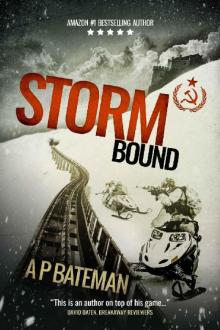 Stormbound
Stormbound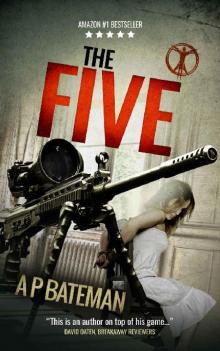 The Five
The Five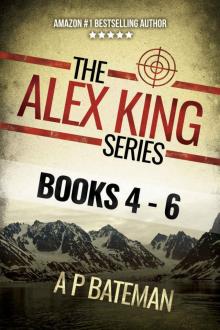 The Alex King Series
The Alex King Series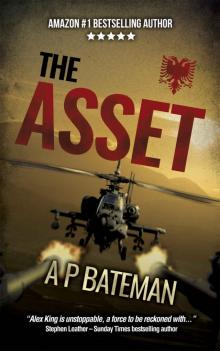 The Asset (Alex King Book 10)
The Asset (Alex King Book 10)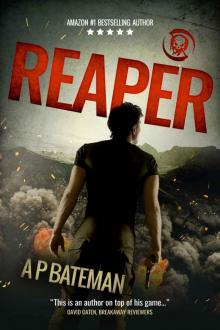 Reaper
Reaper Breakout
Breakout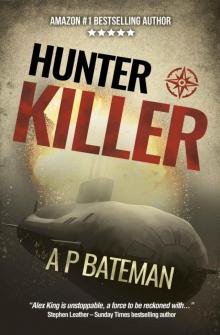 Hunter Killer - Alex King Series 12 (2021)
Hunter Killer - Alex King Series 12 (2021)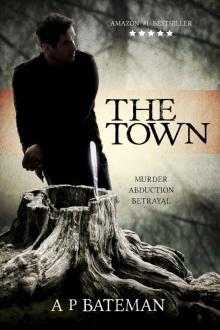 The Town (Rob Stone Book 2)
The Town (Rob Stone Book 2)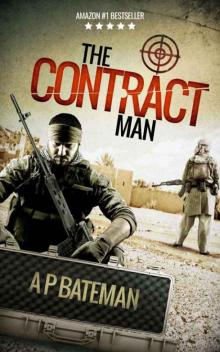 The Contract Man
The Contract Man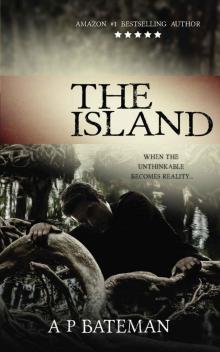 The Island (Rob Stone Book 3)
The Island (Rob Stone Book 3)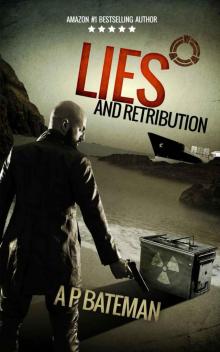 Lies and Retribution (Alex King Book 2)
Lies and Retribution (Alex King Book 2)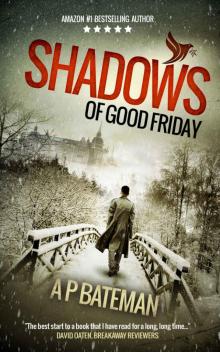 Shadows of Good Friday (Alex King Book 3)
Shadows of Good Friday (Alex King Book 3)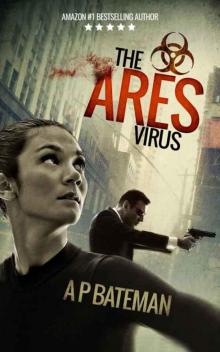 The Ares Virus
The Ares Virus